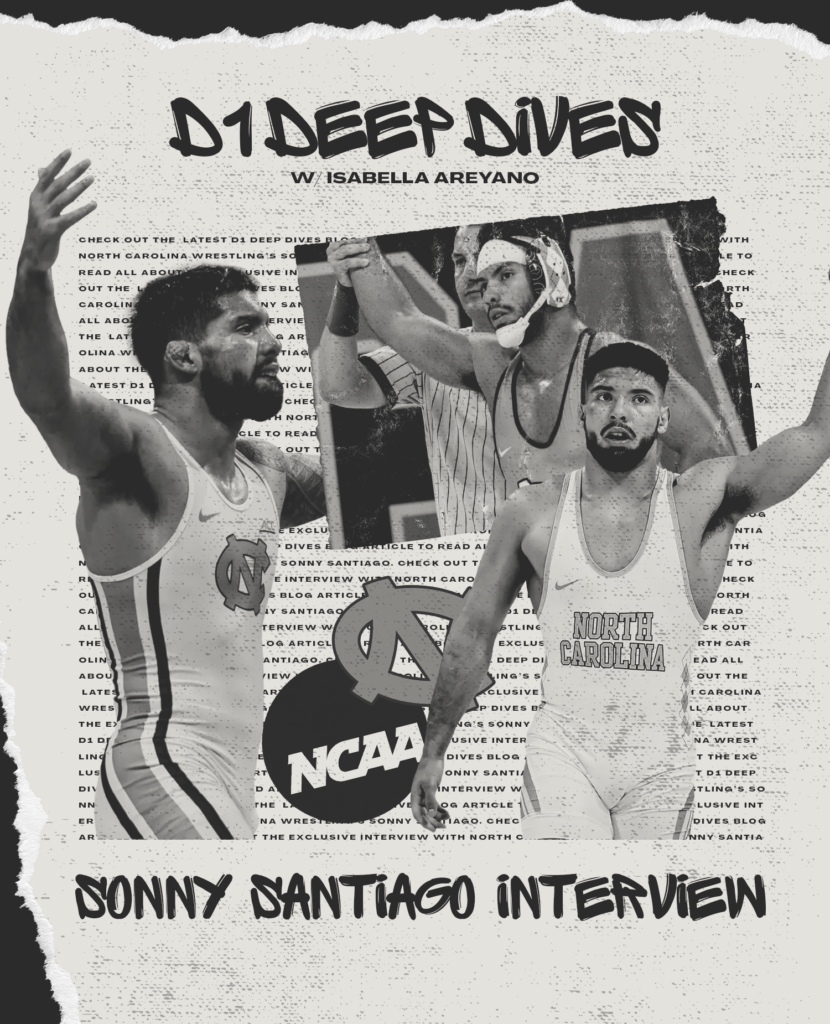By: Isabella Areyano
I recently had the privilege of speaking with North Carolina’s 157-pound wrestler, Sonny Santiago, now in his fifth year. His story is one of transformation—both on and off the mat.
As a child, Sonny was captivated by WWE, and he collected action figures of his favorite wrestlers. Growing up playing football with his older brother, wrestling wasn’t on his radar until his football teammates’ parents suggested it would improve their game. At just eight years old, Sonny’s dad signed him up. Excited, Sonny believed he’d be wrestling like the WWE stars he admired. That excitement quickly took a turn— he tripped while running around in anticipation and broke his pinky before even starting.
From the first practice, it was clear that wrestling was nothing like what Sonny had envisioned. He admitted with a laugh that he struggled for the first three years, even losing regularly to a girl. His family jokingly nicknamed him “Moony” instead of “Sonny” due to the tantrums he threw after every loss.
Things changed when a coach recognized his potential and introduced him to a more competitive wrestling club, where his skills rapidly improved, and he soon began competing at a national level. It was around this time that Sonny faced a tough decision: to quit football and focus solely on wrestling. Though it was a tough realization because his heart was on the football field, Sonny knew his size limited his future in the sport. Even as he excelled on the mat, wrestling was only something he tolerated, not loved.
“It was a struggle, but I was still winning, so I guess that was what kept me going with wrestling- the fact that I had potential, and it was my best chance to get into college,” Sonny shared. His natural talent and growing success pushed him forward, even when his passion hadn’t quite caught up.
Sonny credits his family for being his biggest support and motivation throughout his career. “I’m glad that I can flip the script for them because obviously they gave up a lot… if I can return the favor by showing them that I’m working hard for them, doing whatever I can to fulfill my goals, it makes it all worth it.” Traveling, competing, and representing his family on a global scale is something that makes them proud, and it motivates him to keep striving.
When asked how he copes with the challenges of wrestling, Sonny opened up about the heightened adversity he’s faced in college. “In college, it’s been tough. I haven’t produced the results I’ve wanted, and I’ve worked so hard. After a loss, I find myself asking, ‘Why? What more can I do?’”
But over the last year, Sonny’s perspective shifted. This past summer, he delved into faith more deeply than ever before.
“Now I’m starting to realize that my value isn’t in me being a wrestler, but how wrestling builds my character and how I use wrestling to glorify God.”
Sonny now looks back on both victories and defeats with gratitude. The journey, with all its ups and downs, has shaped him into the man he is today.
“My personality has changed because of all the struggle. If I’m dealing with a loss now, I look at it a lot differently, but before it was like the end of the world.”
This shift in mindset has allowed him to view his wrestling career through a healthier lens. “There’ve been hundreds of college wrestlers before me, and there will be hundreds after me, so as long as I’m becoming a better person through these experiences, I’ll be fine.”
When asked to describe who he is outside of wrestling, Sonny confidently answered, “Now that I see myself as a man of Christ, it’s completely changed my heart and mind.”
He spoke of his newfound focus on others—his family, his teammates, and his coaches. Being someone who genuinely cares, who others can rely on, has become more important to Sonny than the accolades.
“I think 5 years of college wrestling has finally led me to that conclusion– that is more important than being an All American or a national champion. Those things would be great if I achieve them, but my identity isn’t just wrestling; it’s more than that. It’s more in growing my character than it is in awards.”
We wrapped up the interview with a final question—what does he wish more people understood about him? Sonny’s response was thoughtful:
“I just wish people saw beyond the label of ‘D1 Wrestler.’ We’re all human beings. Athletes aren’t superior to anyone; we’re just as flawed as everyone else.”
Sonny Santiago’s journey is a testament to how faith can transform not only your approach to your sport, but also your perspective on life itself.

Leave a Reply